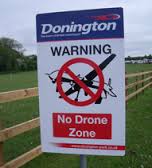Two things come to mind as Gatwick Airport is shut thanks to drones – the risk management of large open spaces, and the extreme ease of carrying out a crime or merely presenting a threat – writes Mark Rowe.
Gatwick Airport’s runway remained closed on the afternoon of Thursday, December 20 and all flights were suspended after reports of drones flying over Gatwick’s airfield the night before and in the morning. Gatwick spoke of ‘significant disruption’, which would be putting it mildly, as a result of what the airport suggested was ‘a deliberate attempt to disrupt flights’.
This would not come as a surprise to the dozens who heard a talk on day one of the International Security Expo at London Olympia recently. A police speaker before a wide-ranging talk by the security director of Heathrow, Tom Willis, spoke of ‘a lot of workshopping’ on how to prevent the impact of a ‘drone incursion’. As the policewoman put it: “Everybody wants the magic button to make the problem go away.” The same is true of crime in general, as seen by the roll-out of CCTV in the 1990s, or identity cards proposed for football fans against hooliganism in the 1980s.
Trouble is, as the police speaker acknowledged, to fly a drone to pose a threat to an entire airport, requires low skill, need only be a lone person – though it could be, like cyber-crime, anyone with a grudge, protesters or malicious nation states, or merely pranksters – and yet causes massive disruption: financial, personal to delayed holiday-makers, and reputational to the country.
What looks unfortunate with hindsight, the policewoman went on to say: “But there is an awful lot we can do with traditional policing and security measures we have in place.”
In truth, police and airport security have an impossible task, to keep out drones, just as prisons (with a much smaller perimeter than the smallest airport) cannot keep away drones from delivering drugs to inmates. Besides the sheer mathematics – Heathrow has a perimeter of eight miles – even if you had police and security bodies around the perimeter, what are they supposed to do if a drone is overhead – shoot it? Send a hawk towards it? Any measures to take down the drone, any kit that can down or disable aircraft, could cause more risk than it solves.
What comes to mind are not so much other drone incursions that have caused less disruption – though there are several, at airports and sports stadia – but the stopping of play in a County Championship cricket match at the Kennington Oval in south London at the end of the 2017 season, when a crossbow bolt landed on the playing field. Play was abandoned and the site evacuated. While the firer was caught, the damage – again, financial and reputational – was done.
While a four-day Championship cricket match hardly counts as a ‘crowded place’, the principle – of extreme risk aversion in case of harm to people and property – is the same as at Gatwick, and to repeat, any airport. It shows how hard it is, once a terror or any security alert is raised, to say with authority that the risk has gone down, to allow ‘back to normal’; for how can you prove an absence of risk, if the original perpetrators are still at large?
It shows also how much of everyday civilised life – sport, the theatre, any sort of travel – rail and road as much as air – relies, in ways we take for granted usually, on everyone abiding by laws of trespass, but also usually unspoken or even unwritten rules.
Speaking of rules, the law on drone use is plain enough; the problem is of enforcing, which the authorities – UK Government and the airspace regulator the Civil Aviation Authority (CAA) besides police – have shown no technological or civic means of improving. A Government consultation on ‘drone use and enforcement’ is in limbo, having asked for example ‘whether the 1km flight restriction around protected aerodromes is sufficient’. Who precisely would police that?!
The CAA limply has passed the buck on drone misuse enforcement to police. The CAA incidentally commented on the Gatwick ‘event’ as ‘an extraordinary circumstance. In such circumstances airlines are not obliged to pay financial compensation to passengers affected by the disruption’.
Picture by Mark Rowe; Donington Park, Leicestershire, ‘no drone zone’ signage.










